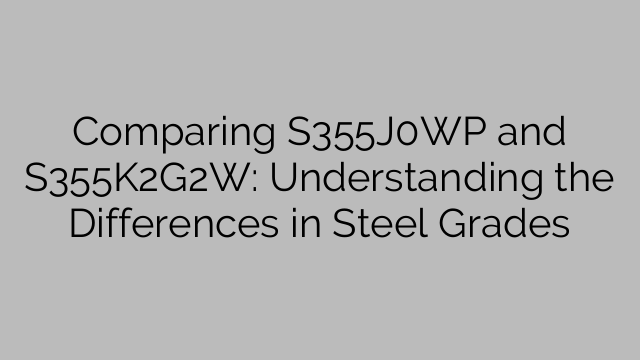Steel is a vital material in various industries, contributing to the construction of buildings, infrastructure, and machinery. However, not all steel grades are created equal, and understanding the differences between them is crucial for achieving optimal performance and durability. In this article, we will compare two steel grades, S355J0WP and S355K2G2W, shedding light on their distinct characteristics and applications.
S355J0WP and S355K2G2W are both weathering steel grades characterized by their enhanced resistance to atmospheric corrosion. Weathering steel, also known as corten steel, forms a protective layer on its surface when exposed to the elements, minimizing the need for maintenance and extending its lifespan. However, despite their common features, these grades exhibit some notable dissimilarities.
Kemisk sammensætning:
The chemical composition of a steel grade plays a significant role in its mechanical properties and corrosion resistance. S355J0WP contains elements such as manganese, phosphorus, sulfur, and copper. Copper is especially crucial as it promotes the formation of the protective oxide layer, enhancing the steel’s resistance to corrosion. S355K2G2W, on the other hand, also contains small amounts of chromium and nickel, in addition to manganese and copper. The presence of these additional alloying elements further improves the grade’s corrosion-resistant properties compared to S355J0WP.
Mekaniske egenskaber:
When assessing steel grades, mechanical properties such as tensile strength, yield strength, and elongation are essential factors to consider. S355J0WP generally exhibits a minimum yield strength of 355MPa and a minimum tensile strength of 470-630MPa, making it suitable for various structural applications. S355K2G2W, on the other hand, possesses a higher minimum yield strength of 450MPa, indicating its superior structural strength. The higher tensile strength and improved elongation of S355K2G2W make it ideal for heavier construction purposes.
Ansøgninger:
Due to their enhanced corrosion resistance, both S355J0WP and S355K2G2W find applications in various industries. S355J0WP is commonly used in architectural structures, such as bridges, buildings, and facades, where its unique aesthetic appeal adds character and longevity. Its excellent resistance to atmospheric corrosion makes it suitable for outdoor sculptures and large-scale artworks as well.
S355K2G2W, with its superior mechanical properties, is often preferred in heavy-duty applications. It is commonly used in the construction of cranes, industrial chimneys, and offshore structures, where durability, structural integrity, and corrosion resistance are paramount.
Overall, while S355J0WP and S355K2G2W are both weathering steel grades with improved corrosion resistance, their dissimilarities lie in their chemical composition and mechanical properties. S355J0WP is best suited for architectural applications, emphasizing aesthetics and weather resistance. S355K2G2W, on the other hand, is better suited for heavy-duty constructions that require strength and durability.
Understanding the differences between various steel grades is essential for selecting the most suitable material for a particular application. By considering factors such as chemical composition, mechanical properties, and intended use, engineers and designers can make informed decisions, ensuring the successful implementation of steel in their projects.

